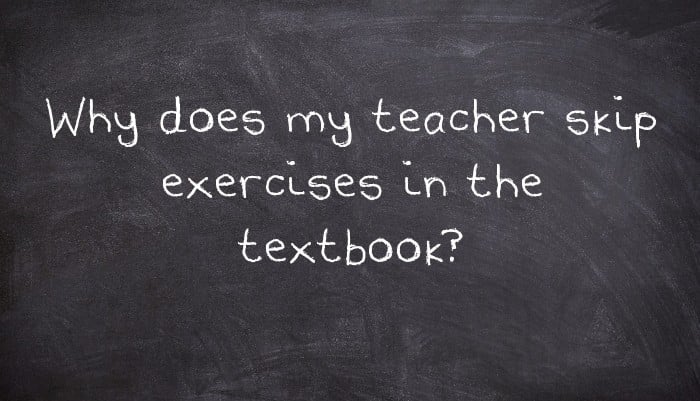Why does my teacher skip exercises in the textbook?
Students often come into English class expecting to work through their textbook in order without missing anything out- maybe because they have paid a lot for the book and expect to get their money's worth and/ or because they trust books more than individual teachers. Most teachers, however, see working through the book one exercise after another as the sign of a bad and lazy teacher. This disagreement is understandable as there are good and bad reasons for skipping exercises in a textbook, and as you will see below sometimes the good and bad reasons are very similar.
Good reasons for skipping a textbook exercise
- Too easy - Textbooks are usually made for a range of students with slightly different levels, strengths and weaknesses, first languages, language learning backgrounds etc. That being the case, it is inevitable that some exercises will be too easy for a particular class and so will just use up time that could be used more productively to learn some new language or do some more challenging practice or skills work in order to get up to the next level.
- Too difficult - For the same reasons as above, some exercises might take too long, teach language that is not useful to get to the next level or tire you out before you try to tackle the main language point of the day.
- Complicated instructions - Some exercises are difficult in a different way, and take so much time and mental effort to understand exactly what you are meant to do that you can't concentrate on the language you are supposed to be learning.
- Repetition - The language and skills practiced in the exercise might be too similar to the presentation stage of the lesson, the homework, or the last lesson. This would make doing that exercise less useful than looking at the same language in a different way or tackling something new.
- Wrong - The information in the exercise could be just wrong- either in the explanations of the grammar, in information about an EFL exam, or in stereotypes about a nationality or other group of people.
- Unpopular - The teacher might have already tried that exercise with one or more classes and found that it was not popular with the students.
- Better for homework - As speaking, pronunciation and the explanation of difficult grammar are best done in the classroom, to make time for these it is sometimes necessary to use a textbook exercise for homework instead of/ as well as the workbook.
- Timing - There might be time restrictions that make it better to skip an exercise, for example in order to fit the language into one class without stopping an exercise halfway through, or due to not having time to keep up with the syllabus and/ or finish the textbook before the end of the course.
- Sticking to the syllabus - It might be that the syllabus for the course is different from the contents of the textbook.
- Changes - The language, the information a text is talking about and/ or the format of an English language exam might have changed since the book was written.
- Bad staging - It might be that there is nothing wrong with the exercise but that using it stops the other stages of the lesson running smoothly together.
Bad reasons for skipping a textbook exercise
- One bad question - There might be just one question in the textbook exercise that is incorrect or does not tie in with the grammar explanation on the same page. In that case, if students are especially keen on using the textbook the teacher should be able to find other ways of adapting the exercise rather than just skipping the whole thing every time.
- Can't simplify - Another adaptation that can sometimes be a better approach than making students worried by skipping textbook exercises is to make the exercise easier by, for example, giving the answers mixed up. Most teachers should be able to do this, so if they always tell you that the reason for skipping an exercise is its difficulty, you might want to ask the school managers whether another approach is possible.
- Oversimplified grammar explanation - Sometimes when the exercise doesn't tie in with the grammar explanation, it is because the teacher has oversimplified the language and the explanation does not cover all the situations in the book. Just as often, though, it is because the book has not simplified the language enough. If nothing in the grammar explanation is new to you but you have difficulties when you try the missed out exercise at home you might want to ask your teacher whether there are any exceptions to the rule they gave.
